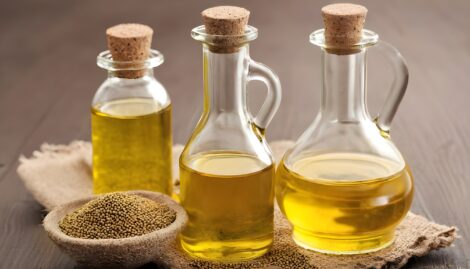- You have no items in your shopping cart
- Subtotal: ₹0.00
Remember those early winter Sundays when your mother had you sit and give yourself a head massage with a generous amount of oil as you watched your favorite TV shows? Being raised in an Indian home, we don’t need any introduction to mustard oil, also known as Sarson ka tel. Mustard oil comes from the mustard plant’s seeds, Brassica campestris. Mustard oil has given us many memories, from making our aam ka achaar (mango pickle) taste even better to increasing the flavor of our mutton curry and fish fry.
Read What Is Cold-Pressed Mustard Oil
Mustard oil has several health benefits, including increasing immunity, protecting the body from colds and coughs, strengthening hair roots, and nourishing the skin. However, the use of mustard oil extends beyond the cooking zone. Many people have been using mustard oil for centuries and have seen numerous benefits from it.

Mustard oil is loaded with beneficial ingredients for the scalp and hair. It contains omega-3 and omega-6 fatty acids, which can improve the health of your hair and promote growth. It also has natural germ-fighting properties, which may help with scalp issues such as dandruff or fungus. This oil can assist with these concerns since it combats bacteria. It is not inappropriate you describe mustard oil as an elixir for your hair. Oiling your hair with mustard oil once a week can also help to prevent hair loss, make it lustrous, and so on.
Mustard oil has several advantages for hair.

Using the best mustard oil for hair will greatly nourish your scalp and strengthen your hair.
Acts like a natural conditioner
Mustard oil is a natural conditioner that keeps your hair soft, smooth, silky, and voluminous. It contains alpha fatty acids, which play a role in preserving the moisture in your hair and keeping it fresh and bouncy.
Helps in nourishing hair
Several people these days suffer from hair loss and thinning, which often occurs when our hair follicles are undernourished and undamaged. However, by massaging your hair follicles with mustard oil on a daily basis, you may restore the strength and gloss of your hair.
Abundant of antioxidants, minerals and vitamins
Did you know that mustard oil has high levels of iron, magnesium, calcium, vitamins A, D, E, and K, as well as antioxidants? This spicy hair oil also contains zinc, beta-carotene, and selenium, all of which promote hair growth and help prevent premature greying.
Improves blood circulation
Undernourished roots are the primary cause of hair loss and thinning, according to several hair specialists. Try massaging your hair with mustard oil if you want your lifeless locks to come back to life. It’s an organic stimulant. When applied to the scalp, it enhances blood circulation and activates the circulatory system. The simplest method to put this into practice is to warm up some oil with some cloves in it and use your fingers to gently massage your hair. Try this twice a week for improved outcomes.
Encourages hair growth
Your hair will become lustrous, silky, and healthy with regular hair massages with mustard oil. Mustard oil accelerates hair growth since it is high in antioxidants and several other minerals.
Has anti-fungal properties
As mustard oil has a high concentration of erucic acid and ALA, it can help cleanse your scalp and get rid of germs and fungi that clog hair follicles and cause buildup on the scalp.
Keeps dandruff away
Regular use of mustard oil, which has antibacterial and antioxidant properties, can help maintain a clean scalp free of dandruff.
Hair fall and breakage
Mustard oil can also address hair fall and breakage problems. Mustard oil comprises the three important nutrients of proteins, vitamin B, and fatty acids. They make the hair strong and also prevent the problem of breakage.
Split ends issue
When the hair becomes very dry, the issue of split ends arises. Mustard oil can come to the rescue of those people who have the issue of split ends. Its moisturizing qualities can retain the moisture of your hair and thus it does not become dry and neither it split.
Tips on using the mustard oil properly
It is quite safe to use mustard oil. However, before using the oil on your scalp, you must perform a quick patch test at least 24 hours beforehand. Mustard oil often leads to allergic reactions such as skin rashes that manifest as blisters and lesions. If it is not thoroughly cleaned, it can also irritate the eyes and clog pores.
By simply rubbing mustard oil onto the scalp to increase circulation, you could use it as a stand-alone component in hair care products. Give your scalp a good massage and throw on a shower hat. After 30 minutes, give it a regular wash with a gentle shampoo and conditioner.
Using for hair and massage
Enhancing blood circulation and easing tense muscles are two benefits of scalp massage. Strengthening and growing hair is helped by this. The health advantages of mustard are well recognized, and they also apply to hair health. Mustard oil contains the majority of the nutrients required for hair development, along with antioxidants and minerals including iron, calcium, and magnesium. Mustard oil massages your scalp in a way that promotes growth and wellness. Additionally, mustard oil has a warming quality that helps you sleep well and keeps you comfortable.
Deep conditioning
Dry hair may occur from daily stress and pollutants. Itching, irritation, and dandruff are common in people with dry scalps. Dry hair looks unattractive and gets fragile. Because mustard oil naturally contains fat, it functions as a conditioner and keeps your hair hydrated. You might not want to wear it out with it on your hair because it is a heavy oil. Your hair will be frizz-free, hydrated, and silky after using mustard oil all night and giving it a thorough wash.
Helps in reducing inflammation and pain
For centuries, mustard oil has been traditionally used as an antiseptic due to its therapeutic properties. It’s likely that you have heard your granny gushing over mustard oil. Microbial development is stopped by mustard oil. It works wonders for easing scalp discomfort and inflammation. It may sting a little on the first application, but that’s just because it’s working. After applying mustard oil to the afflicted areas, keep your distance and let the oil do its magic.
Preventing dandruff
Using mustard oil on your hair keeps it hydrated and helps to avoid dandruff. A scalp that has been overwashed or neglected tends to dry out because its natural oils are lost. Restoring the equilibrium can be improved with mustard oil. Mustard oil might assist you in battling dandruff if you currently have it. This oil’s antibacterial properties combat the microorganisms that cause recurrent dandruff. This oil’s antioxidants and minerals promote healthy hair development and help prevent dandruff.
Treats scalp infection
The use of wrong hair products or neglecting to maintain the quality of your hair might lead to scalp infections. It may be a major annoyance and source of irritation. The antibacterial and therapeutic qualities of mustard oil combat and quickly decrease the microorganisms that cause the problem. It contains antioxidants that aid in the hair follicles’ recovery from the infection’s damage. Additionally, its hydrating qualities prevent the scalp from drying out. Use products that are appropriate for your hair type and low in potentially dangerous ingredients.
Effective ways of using Mustard oil to encourage hair growth
Mustard Oil with Yogurt Pack
Mix the yogurt and the mustard oil In a mixing dish. Apply this mixture to the scalp. Wrap your hair in a heated towel and let it sit for around 30-40 minutes. Wash with a gentle shampoo. This will calm the scalp while making the hair shinier and softer.
Mustard Oil with Aloe Vera Pack
Combine the mustard oil and the aloe vera in a bowl. Apply this mixture to the hair and scalp. Leave it on for an hour before washing it with regular shampoo and conditioner. This will protect the hair from damage.
Mustard Oil with Lemon Juice Pack
Take a combination of mustard oil, lemon juice, and fenugreek powder and blend well in a basin. Mix in equal parts and apply to hair. Wash after one hour to achieve softer, bouncy, and healthier hair.
Mustard Oil with Banana Pack
Prepare a pack of ripe bananas with mustard oil. To thin down the mixture, add some yogurt. Apply this to your scalp to avert frizzy hair. For best results, use it twice each week.
Frequently asked questions
Can mustard oil potentially regrow your hair?
Mustard oil is the solution you’ve been looking for. It provides several advantages to the health of the hair and scalp. Mustard oil may be used as a stand-alone component in hair care by rubbing it into the scalp to increase circulation. Massage your hair well and cover it with a shower cap. After 30 minutes, wash the hair normally with a gentle shampoo and conditioner.
Can mustard oil be left on hair overnight?
Yes, you can leave mustard oil overnight. Its warm quality might also help you sleep better, particularly after a nice massage with the oil. But because the oil is heavy, it may feel sticky or overwhelming in your hair. It also has an intense smell that may cause your eyes to moisten or make you feel uncomfortable. So, make sure you’re okay with it. Also, if you have an oily scalp, putting oils in your hair overnight will interfere with your natural scalp oils, so wash them out after a few hours of application.
Is hair darkened by mustard oil?
Yes, mustard oil is a natural substitute for traditional hair color due to its organic coloring and conditioning properties. The ingredients in the henna and mustard oil mixture, if applied on a regular basis, will color your gray hair without harming it.
Conclusion
The uses of mustard oil go beyond simple cooking oil. The rich nutritional makeup of this oil offers a host of benefits for skin, hair, and overall wellness.
It is a great source of minerals, potent antioxidants, and monounsaturated fatty acids. More research is needed to fully understand its benefits for hair and other characteristics. Generally speaking, using mustard oil on skin and hair is safe.
Applying mustard oil may hydrate your hair and scalp. Additionally, it could reduce scalp irritation or inflammation. If you use mustard oil therapy for the first time, do a patch test just like you would with other natural oils.
